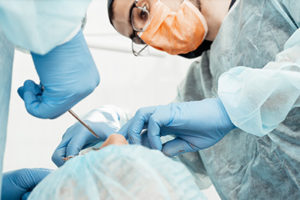Oral surgery is an occasionally necessary procedure. With this, a dentist and their staff will operate on your mouth, teeth, or gums. Despite the use of the word “surgery,” this procedure is usually relatively quick. It doesn’t take too long for patients to recover. It is only used in instances where it is necessary. This procedure can often help individuals recover from significant mouth or tooth problems. To learn more, contact Lovett Dental Webster.
What Is Oral Surgery?
Oral surgery is a specific type of surgery that fixes problems with your teeth or mouth. A qualified, trained surgeon and his or her assistants will perform the surgery. Keep in mind that a dentist must earn specific certifications and qualifications to perform the operation.
This type of surgery usually involves using some kind of anesthesia, although the specific type varies. For lighter, more straightforward procedures, like a cavity or root canal, you may receive a local anesthetic. This is usually a matter of simply injecting a numbing agent into the tooth, gums, or mouth. This ensures that you won’t feel pain during the procedure.
For more significant operations, like certain types of tooth extractions or repair work, you may receive IV sedation or general anesthesia. This will result in some form of unconsciousness and the feeling of being “put to sleep.” This may require that you spend some time, usually no more than a day, recovering from a procedure.
When Is Oral Surgery Necessary?
It isn’t easy to provide an exact list, but there are many instances where this type of surgery is necessary. Such services our team provides include:
- Tooth removal
- Impacted tooth treatment
- Severe jaw issues
- Tooth implants procedure
- Nerve repair
What Can I Do To Prepare for Oral Surgery?
Fortunately, a good oral surgeon will give you the information you need to prepare for your surgery properly. Most oral surgeries are relatively common experiences. What you will go through is likely something that patients across the country endure regularly. As such, a good surgeon will have ample experience to draw upon.
First, make sure you ask your surgeon and their team any questions you have. Visiting an oral surgeon can be a frightening experience. It may be easier for you to write down any questions you have to ensure that you don’t forget them.
Second, make sure to heed your surgeon’s advice. Each surgeon and procedure has different requirements, and your surgeon and their staff will be able to help you prepare for the surgery.
Third, make sure that you can get to and from your oral surgeon. While you may be able to function fine after receiving a local anesthetic, a general anesthetic will make you unable to operate a motor vehicle. As such, make sure that someone is able to drive you to and from the surgery and care for any of your immediate needs once the surgery is complete.
Last, make sure you know your plan for aftercare. There may be specific rules for eating, drinking, exercising, returning to work, and taking medication. It would be best if you understood what all of these rules are in order to best take care of yourself.
Contact Lovett Dental Webster Today
There is no question that this surgery can be tremendously helpful in helping you address some very serious mouth or teeth problems. If you live in Houston, Texas, area and need dental care, we can help. We provide:
To learn more about our specialty dental service options, call Lovett Dental Webster today at 832-932-5584, or contact us online.
